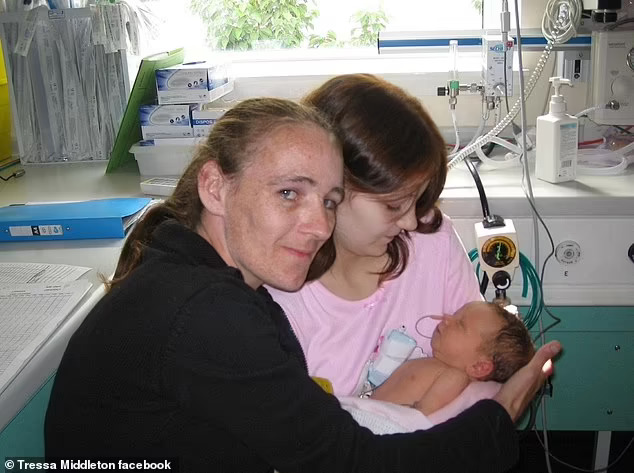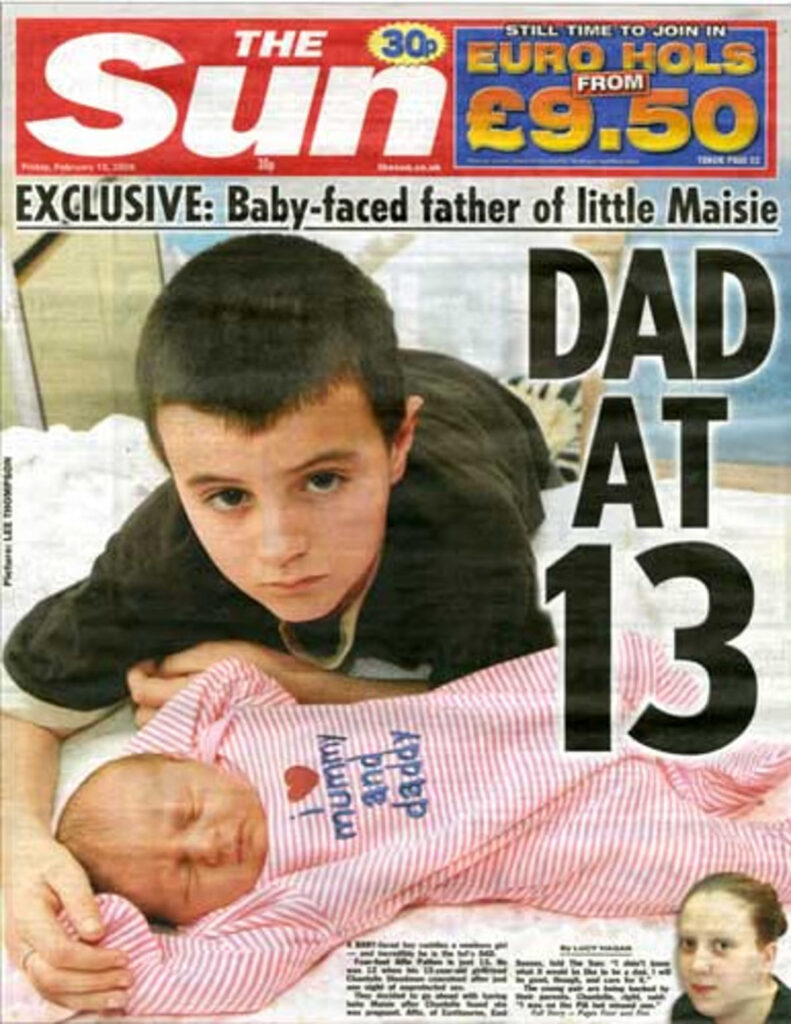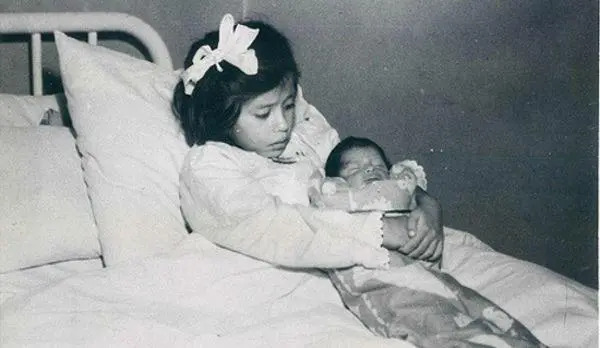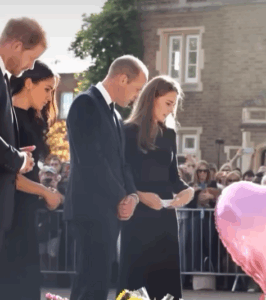100s of bikers showed up to funeral of a little boy nobody wanted to bury because his father was in prison for murder. The funeral director had called us after sitting alone in the chapel for two hours, waiting for anyone – anyone at all – to come say goodbye to little Tommy Brennan.
The boy had died of leukemia after fighting for three years, his grandma his only visitor, and she’d had a heart attack the day before his funeral. Child services said they’d done their duty, the foster family said it wasn’t their responsibility, and the church said they couldn’t associate with a murderer’s son.
ADS 1
So this innocent child who’d spent his last months asking if his daddy still loved him was about to be buried alone in a potter’s field with just a number for a headstone. That’s when Big Mike, president of the Nomad Riders, made the call; “No child goes into the ground alone,” he’d said. “I don’t care whose son he is.” What none of us knew was that Tommy’s father, sitting in his maximum security cell, had just received the news of his son’s death and was planning to end his own life that night.
The guards had him on suicide watch, but we all knew how that usually ended. What happened next would not only give a dead boy the sendoff he deserved, but would also save a man who thought he had nothing left to live for. We use your personal data for interest-based advertising, as outlined in our Privacy Notice.
I was drinking my morning coffee at the clubhouse when the call came in. Frank Pearson, the funeral director at Peaceful Pines, sounded like he’d been crying. “Dutch, I need help,” he said. “I’ve got a situation here I can’t handle alone.” Frank had buried my wife five years ago, had treated her with dignity when cancer took her down to 80 pounds. I owed him. “What’s wrong?” “There’s a boy here. Ten years old. Died yesterday at County General. Nobody’s come. Nobody’s coming.” “Foster kid?” “Worse. His dad’s Marcus Brennan.” I knew that name. Everyone did.
Marcus Brennan had killed three people in a drug deal gone wrong four years ago. Life without parole. The news had been everywhere. “The boy’s been dying of leukemia for three years,” Frank continued. “His grandmother was all he had, and she had a heart attack yesterday. She’s in ICU, might not make it. The state says bury him.
The foster family washed their hands. Even my staff won’t help. They say it’s bad luck, burying a murderer’s kid.” “What do you need?” “Pallbearers. Someone to… to witness. He’s just a boy, Dutch. He didn’t choose his father.” I stood up, my decision made. “Give me two hours.” “Dutch, I only need maybe four people—” “You’ll have more than four.” I hung up and hit the air horn in the clubhouse. Within minutes, thirty-seven Nomad Riders stood in the main room. “Brothers,” I said. “There’s a ten-year-old boy about to be buried alone because his father’s in prison. Kid died of cancer. Nobody will claim him.
Nobody will mourn him.” The room was silent. “I’m riding to his funeral,” I continued. “I’m not asking anyone to come. This isn’t club business. But if you believe no child should go into the ground alone, meet me at Peaceful Pines in ninety minutes.” Old Bear spoke first. “My grandson’s ten.” “Mine too,” said Hammer. “My boy would’ve been ten,” Whiskey said quietly. “If the drunk driver hadn’t…” He didn’t need to finish. Big Mike stood up. “Call the other clubs. Hell, call every club. This isn’t about territory or patches.
This is about a kid.” The calls went out. Screaming Eagles. Iron Horsemen. Devil’s Disciples. Clubs that hadn’t spoken in years. Clubs that had actual blood feuds. But when they heard about Tommy Brennan, every single one said the same thing: “We’ll be there.” I rode to the funeral home first to talk to Frank. He was standing outside the small chapel, looking lost. “Dutch, I didn’t mean—” The rumble cut him off.
First came the Nomads, forty-three bikes. Then the Eagles, fifty strong. The Horsemen brought thirty-five. The Disciples, twenty-eight. They kept coming. Veterans clubs. Christian riders. Weekend warriors who’d heard through social media. By 2 PM, Peaceful Pines parking lot and every street within three blocks was filled with motorcycles. Frank’s eyes were wide. “There must be three hundred bikes here.” “Three hundred and twelve,” Big Mike corrected, walking up. “We counted.” Frank led us inside to the small chapel where a tiny white coffin sat alone, one small bouquet of grocery store flowers beside it. “That’s all?” Snake asked, his voice rough. “The hospital sent the flowers,” Frank admitted. “Standard procedure.” “Fuck standard procedure,” someone muttered.
Then the chapel started filling. These rough men, many with tears already in their eyes, filing past this small coffin. Someone had brought a teddy bear. Another, a toy motorcycle.
Soon the coffin was surrounded by offerings – toys, flowers, even a leather vest with “Honorary Rider” patched on it. But it was Tombstone, a grizzled vet from the Eagles, who broke everyone. He walked up to the coffin, placed a photo against it, and said, “This was my boy, Jeremy. Same age when leukemia took him.
I couldn’t save him either, Tommy. But you’re not alone now. Jeremy will show you around up there.” One by one, bikers stood to speak. Not about Tommy – none of us knew him. But about children lost, about innocence destroyed, about how no child deserved to die alone regardless of their father’s sins. Then Frank got a phone call.
He stepped out, came back white-faced. “The prison,” he said. “Marcus Brennan… he knows. About Tommy. About the funeral. The guards have him on suicide watch. He’s asking if anyone… if anyone was here for his boy.” The chapel went silent. Big Mike stood. “Put him on speaker.” Frank hesitated, then dialed.
A moment later, a broken voice filled the chapel. “Hello? Is anyone there? Please, is anyone with my boy?” “Marcus Brennan,” Big Mike said firmly. “This is Michael Watson, president of the Nomad Riders. I’m here with three hundred and twelve bikers from seventeen different clubs. We’re all here for Tommy.” Silence.
Then sobbing. Deep, gut-wrenching sobs from a man who’d lost everything. “He used to… he used to love motorcycles,” Marcus choked out. “Before I screwed up. Before I… He had a toy Harley. Slept with it every night. Said he wanted to ride when he grew up.” “He will ride,” Big Mike promised. “With us.
Every Memorial Day, every charity run, every time we mount up, Tommy rides with us. That’s a promise from every club here.” “I couldn’t even say goodbye,” Marcus whispered. “Couldn’t hold him. Couldn’t tell him I loved him.” “Then tell him now,” I said, stepping forward. “We’ll make sure he hears it.” For the next five minutes, the chapel was filled with a father’s goodbye. Marcus talked about Tommy’s first steps, his love of dinosaurs, how brave he’d been during treatment.
He apologized over and over for not being there, for the choices that had taken him away. “I know I don’t deserve forgiveness,” he finished. “I know I’m where I belong. But Tommy… he was good. He was pure. He deserved better than me.” “He deserved a father who loved him,” Big Mike said. “And he had that. A flawed father, a broken father, but a father who loved him. That matters.” “I’m supposed to do this alone,” Marcus said quietly. “I’m supposed to die knowing I failed him.” “No,” Snake said firmly. “You live. You live knowing three hundred strangers showed up for your boy.
You live knowing he mattered. You live because giving up now dishonors his memory.” “But what’s the point? He’s gone.” Old Bear stepped up to the phone. “The point is there are other boys in that prison whose fathers are making your mistakes. You stay alive and you tell them. You tell them what it costs.
You save other kids by saving their fathers from becoming you.” The line was quiet for so long we thought he’d hung up. Then: “Will you… will you bury him right? Please?” “Brother,” I said, “your son will have the funeral of a warrior. I promise you that.” After Marcus hung up, we carried Tommy Brennan to his final rest. Six bikers from six different clubs bore the small coffin. Three hundred riders followed, engines running just above idle, the rumble shaking the earth like thunder. At the grave, instead of a priest, we had Chaplain Tom from the Christian Riders. His words were simple: “Tommy Brennan was loved. By his father, by his grandmother, and today, by every soul here. Love transcends mistakes. Love transcends prison walls. Love transcends death.” As they lowered the coffin, we revved our engines. Three hundred and twelve motorcycles roaring together, a sound that could probably be heard at the prison fifteen miles away.
ADS 2
A final ride for a boy who’d never get to have his first. But the story doesn’t end there. Two weeks later, I got a call from the prison chaplain. Marcus Brennan had started a program called “Letters to My Child,” helping other inmates write to their kids, maintain connections, be fathers from behind bars. In six months, it had spread to twelve prisons. Tommy’s grandmother recovered. She now rides with us, on the back of Big Mike’s bike, wearing a vest that says “Tommy’s Grandma” on the back. She brings cookies to every meeting. And Tommy’s grave? Never empty.
There’s always a bike parked nearby, someone visiting, leaving a toy motorcycle or a flower. The groundskeeper says it’s the most visited grave in the cemetery. Last month, a woman approached me at a gas station. Her son had been in the foster system with Tommy, she said. They’d been friends. She’d wanted to come to the funeral but had been afraid because of Marcus, because of the stigma. “I heard what you all did,” she said, tears in her eyes. “My son heard too. He wants to know… can he visit Tommy’s grave?” “Any time,” I said. “He’s one of ours now.” She nodded, then handed me a small toy motorcycle. “This was Tommy’s. From his room at the foster home. My son saved it. He thought… he thought Tommy should have it.” That toy motorcycle now sits in our clubhouse, in a place of honor.
Below it, a plaque: “Tommy Brennan – Forever Ten, Forever Riding, Forever Loved.” Marcus is still in prison. Will be until he dies. But he’s alive, and he’s helped over two hundred inmates reconnect with their children. He sends us a letter every month, thanking us for saving two lives that day – Tommy’s memory and his own soul.
And every time we ride, I swear I can feel him. Little Tommy Brennan, finally on that motorcycle he dreamed about, riding with three hundred and twelve bikers who stood up when the world turned away. Because that’s what we do. We show up for the forgotten. We stand for the abandoned. We carry those who have no one else to carry them. Even if it’s just a small white coffin and a boy whose only crime was having the wrong father. Especially then.













 Fact Stream Daily
Fact Stream Daily

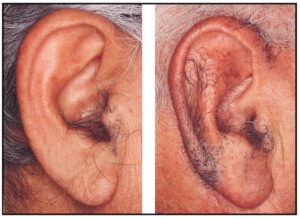
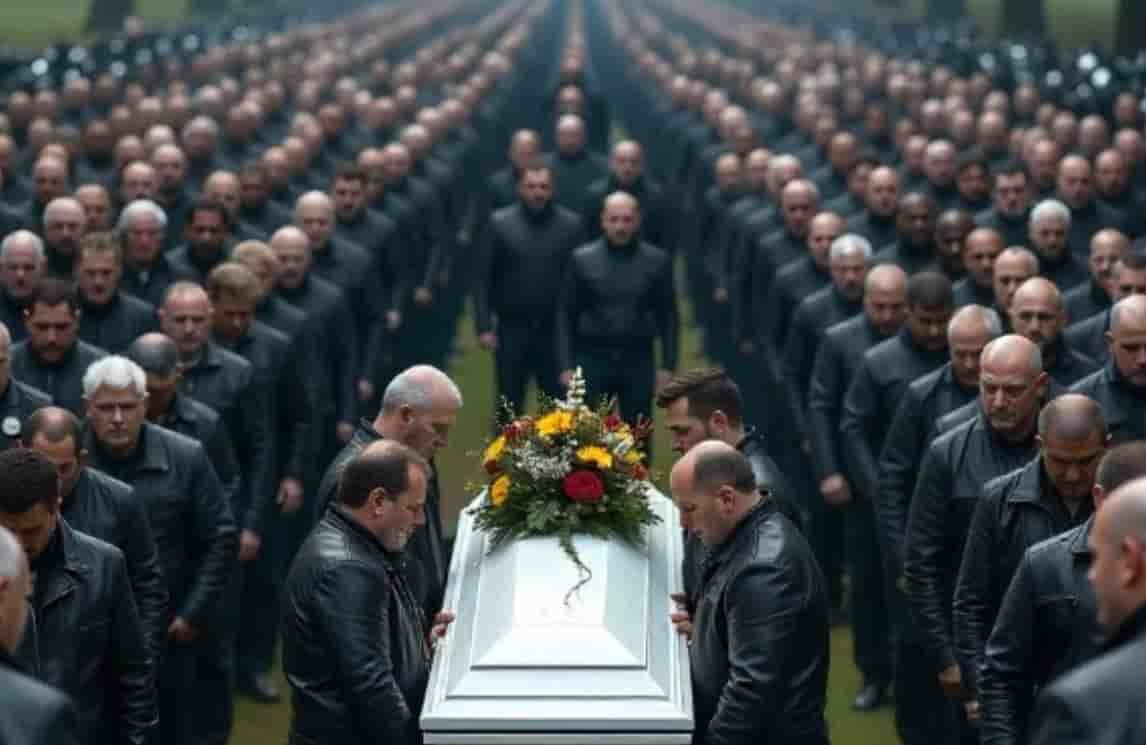






 ; a woman considered crazy and forgotten by many, suffering from serious illness, and carrying a terrible past. Most people would have said, “I don’t want to be in that role,” but I felt differently
; a woman considered crazy and forgotten by many, suffering from serious illness, and carrying a terrible past. Most people would have said, “I don’t want to be in that role,” but I felt differently  .
.
 . For many, it’s just acting technique. But for me, it became a journey into another world, into another person’s life. I didn’t just want to play Pepper. I wanted to understand her
. For many, it’s just acting technique. But for me, it became a journey into another world, into another person’s life. I didn’t just want to play Pepper. I wanted to understand her  We see someone’s illness, their deformity, or a single mistake, and we already cross them off. But life is never that simple. Every story has something it hasn’t told us.
We see someone’s illness, their deformity, or a single mistake, and we already cross them off. But life is never that simple. Every story has something it hasn’t told us.
 . But I tried to see her not as a criminal, but as a human being. Someone who, inside, also longed for love and warmth.
. But I tried to see her not as a criminal, but as a human being. Someone who, inside, also longed for love and warmth. We all make mistakes. It’s easy to see others’ mistakes, but accepting your own—that’s much harder.
We all make mistakes. It’s easy to see others’ mistakes, but accepting your own—that’s much harder.
 . That’s when you realize how important kindness is. Because if you can’t forgive, if you can’t try to understand—even the darkest character—how can you claim to be human?
. That’s when you realize how important kindness is. Because if you can’t forgive, if you can’t try to understand—even the darkest character—how can you claim to be human? . I learned that transformation—even the heaviest kind—can open your heart to others. Human values are always the same: compassion, forgiveness, trust. Pepper taught me that
. I learned that transformation—even the heaviest kind—can open your heart to others. Human values are always the same: compassion, forgiveness, trust. Pepper taught me that  .
. . And as an actor, as a human, I must not fear the difficult paths. Because only then do you uncover true beauty.
. And as an actor, as a human, I must not fear the difficult paths. Because only then do you uncover true beauty. . And if even one viewer, one person, sits and thinks, “maybe there really is a light in everyone,” then my work mattered.
. And if even one viewer, one person, sits and thinks, “maybe there really is a light in everyone,” then my work mattered. . Within us or around us is a story we fear to approach. But if we dare to look into their eyes and try to understand, we will see not just darkness, but a soul searching for love
. Within us or around us is a story we fear to approach. But if we dare to look into their eyes and try to understand, we will see not just darkness, but a soul searching for love 


 How to Spot the Sweetest and Crunchiest Ones in Seconds
How to Spot the Sweetest and Crunchiest Ones in Seconds 

 Whether you’re baking a pie, making a fresh salad, or simply grabbing a juicy snack, here’s how to pick apples that are bursting with flavor and crunch!
Whether you’re baking a pie, making a fresh salad, or simply grabbing a juicy snack, here’s how to pick apples that are bursting with flavor and crunch! 
























